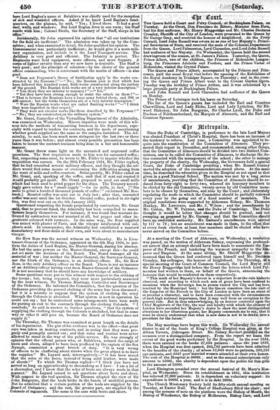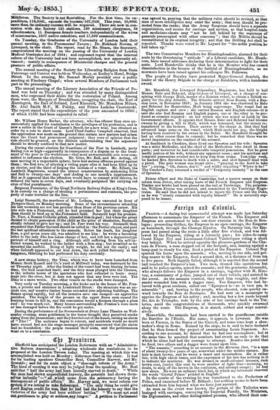Ijt 311rtrupulis.
Since the Duke of Cambridge, in preference to the late Lord 'Mayor, was elected _President of Christ's Hospital, there has been an increase of the tendency to reform. Last year, a Committee was appointed to in- quire into the constitution of the Committee of Almoners. They pre- sented their report in December, and recommended, among other things, that the Committee of Almoners should be divided into two distinct Com- mittees, one to be veiled the Committee of _Almoners, to discharge the du- ties connected with the management of the school; the other to manage the property of the charity, .0n Wednesday, the Governors held a apecial Court, the Duke of Cambridge presiding ; when Mr. Russell Gurney moved the adoption of the recommendations stated above. At the same time, he-described the education given in the Hospital as not equal to that given in a good National School. The motion was met by a long series of amendments, providing that the Conmiittee of Almoners should be re- duced from forty-eight to forty-two, whereof six honorary 'members to be elected by. the old Committee, twenty-seven by old Conniaittee mem- bers to be chosen by themselves, and nine by the Court ; and'elaborately regulating the mode in which the Committee should be partially renewed every year by the going out of a fixed number of members. The original resolutions were supported by Alderman Sidney, Mr. Thomson Hankey, Mr. Lawrence, and Mr. J. Wilson ; and the amendments by Mr. Cotton, Mr. W. Paynter, and the Duke of Cambridge. The Duke thought it would be better that changes should be gradual, and not eweepieg as proposed by Mr. Gn _; Ind that the Committee should
have an undivided authority. Mr. 'a amendments were carried by 117 to 78; but an amendment was_made in them, to the efl'eot that at every fresh election at least four members shall be elected who have never served on the Committee before.
At a meeting of the Court of Aldermen, on Wednesday, a resolution was passed, on the motion of Alderman Sidney, expressing the profound- est sorrow that an attempt should have been made to assassinate the Em- "peror of the French, and tendering the warmest sympathy to the Em- peror and 'Empress. At the same sitting, Mr. Sheriff Muggeridge an- nounced that the Queen had conferred upon himself and Mr. Hearst's Crossley, his colleague, the honour of knighthood. On Thursday, it a special meeting of the Court of Common Council, the Lord Mayor and Sir Henry Muggeridge laid before the Court the letters which Lord Pal- merston had written to them, on behalf of the Queen, announcing the honours that would be conferred' on them respectively.
"This mark of her Majesty's favour is a departure fronrthe rule hitherto observed, and according to which such acts of grace have been confined to -000RsiOns when the Sovereign has in person visited the City and has been received by the Municipal body : but the Queen considers the late visit of the Emperor of the French to the City of London to have been an event of so peculiar a Character, and to have been connected with the circumstances of such high national importance, that it may well form an exception to the general rule. But in thus acknowledging, by an honour conferred upon the Chief Magistrate of the Cite, the zeal and loyalty with which the citizens of London have seconded her -Majesty's desire to show the most distinguished attentions to her illustrious guests, her Majesty commands me to say, that it must be clearly understood that what is now done is not to be drawn into a precedent for the future."
_ .
The May meetings have begun this week. On Wednesday the annual dinner in aid of the funds of King's College Hospital was given at the Albion Tavern, Aldersgate Street. Mr. Sidney lielbert presided on the occasion over a distinguished company. From the report we learn the extent of the good works performed by the Hospital. In the year 1854, there were entered on the books 27,694 patients : sinew the year 1839, when the Hospital was first opened, 282,705 patients have been admitted to the benefits of the charity ; of whom 17,943 were hi-patients, 259,235 out-patients, and 5527 poor married women attended at their own homes. The cost of the Hospital is 50001.: and as the annual subscriptions only amount to 15001., the charity is dependent upon the public for free gifts to the amount of 35001.
Lord Ebrington presided over the annual festival of St. Mary's Hos- pital, on Wednesday. Since its establishment in 1861, this institution has relieved 27,000 patients. It is dependent on voluntary support : its expenditure is 60001. a year, and it is in debt 26001.
The Church Missionary Society held its fifty-sixth annual meeting on Tuesday, at Exeter Hall. The Earl of Shaftesbury filled the chair ; and among the persons of note on the platform were the Bishop of /death, the Bishop of Winchester, the Bishop of Melbourne, Bishop Carr, and Lord Middleton. The Society is not flourishing. For the first time, its ex- penditure, 116,256/., exceed its income, 107,3431. This year, 10,0001. More than its ordinary income will be required. There are now in con- nexion with the Society 121 stations, 189 missionary clergymen, 39 schoolmasters, 11 European female teachers independently of the wives of missionaries, 1697 native catechists, and 17,899 communicants.
On Tuesday, the Graduates of the University of London held their annual meeting, in the Freemasons' Tavern ; Dr. Birkbeck Nevins, of Liverpool, in the chair. The report, read by Mr. Sheen, the Secretary, congratulated the meeting on the passing of the University of London Medical Graduates Act of 1854; and expressed regret that the internal reform of the University had not been accomplished, nor apparently ad- vanced; mainly in consequence of Ministerial changes and the general pressure of public affairs.
The annual meeting of the Society for Liberating Religion from State Patronage and Control was held on Wednesday, at Radley'a Hotel, Bridge Street. In the evening, Mr. Samuel Morley presided over a public meeting at Finsbury Chapel ; when several Members of Parliament took part in the proceedings.
The annual meeting of the Literary Association of the Friends of Po- land was held on Thursday ; and was attended by many distinguished men, who expressed their desire for the restoration of Poland. Among them were, the Marquis of Breadalbane' occupying the chair, the Earl of Harrington, the Earl of Zetland, Lord llinnaird, 'Mr. Monckton Milnes, Mr. Abel Smith M.P., M. Pulsky, and Prince Ladislas Czartoryski. The report stated that the expenditure of the year amounted to 16461.; of Which 1153/. had been expended in relief.
Mr. William Henry Barber, the attorney, who has oftener than once un- successfully applied for readmission to the privileges of his profession, and is now a suitor in the Court of Queen's Bench for anew trial, has obtained an order for a rule to show cause. Lord Chief Justice Campbell observed, that the application was made on the ground that certain new matters had arisen since the Court had pronounced judgment : they were of opinion that the rule should be granted, on the distinct understanding that the argiunent should be strictly confined to that new matter.
During the recent election for Guardians of the Poor in Lambeth, party feeling ran so high—apparently in consequence of a dispute as to the treat- ment of the poor in the workhouse—that most unwarrantable acts were com- mitted to influence the election. Mr. Giles, Mr. Ball, and Mr. Arding, all men moving in a respectable sphere, have had serious offences proved against them ; the first two of uttering a voting paper after it had been filled up by
an elector, and the two, of forging the initials of a voter. Mr. Elliott, the Lambeth Magistrate, caused the utmost consternation by sentencing Giles and Ball to twenty-one days' and Arding to one month's imprisonment. But as it appeared that the offenders would have to consort with thieves, he reduced the term to seven days; and eventually postponed the carrying out even of that punishment.
Sergeant Parminter, of the Great Northern Railway Police at King's Cross, is in custody on a charge of stealing a portmanteau and contents, the pro- perty of seine traveller on the line.
Luigi Duranelli, the murderer of Mr. Latham, was executed in front of Newgate Gaol, on Monday morning. Some of the circumstances attending his last moments are not less peculiar than those of his previous career. His late wife was a Protestant, and he had promised her that their daughter Rosa should be bred up in the Protestant faith. Buranelli kept his promise. Dr. Farr, a Roman Catholic priest, attended him in gaol ; but when the priest desired to obtain possession of the child as the price of absolution, Buranelli stoutly refused to give her up ; and Dr. Farr went his way. Bamnelli then requested that Father °avers' should be called in : the Father obeyed, and paid the last spiritual attentions to the assassin. Before his death, his daughter Rosa, a girl seven years old, was admitted to see him : he wrote a becoming letter to the lady who has taken charge of her, and left her a daguerreotype portrait of himself and a ring. Although still suffering from his self-in- 'Rioted wound, he walked to the ladder with a firm step ; but trembled as he mounted the scaffold. Being of light weight, be did not die easily ; and when Culcraft appeared to cut him down, the mob yelled furiously at the hangman, thinking he had performed his duty carelessly.
A new steam battery, the Etna, which was to have been launched from Messrs. Scott Russell and Co.'s yard at Millwall today, was destroyed by fire on Thursday night. After the timber of the vessel had been blazing for some time, the hull launched itself, and the fiery mass plunged into the Thames, to the infinite terror of the spectators who had collected in boats : many leapt into the river, but it does not appear that any lives were lost. The Etna is a mere wreck. Two other vessels on the stocks were damaged.
Very early on Tuesday morning, a fire broke out in the house of Mr. Pres- ton, a printer and stationer in Leadenhall Street : the structure was an an- cient one, and massive timber beams extended into adjoining buildings. The flames spread rapidly, but all the inmates save one escaped—an apprentice perished. The weight of the presses on the upper floors soon caused the burning house to fall in, and the concussion forced a fireman through a glass roof : he was much cut. Many houses surrounding Mr. Preston's were more or less damaged before the fire could be got under.
During the performance of La Sonnat,:hula at Drury Lane Theatre on Wed- nesday evening, some gentlemen in the boxes thought they perceived smoke riling from the proscenium; and they hurried out of the house, raising an alarm of" Fire!" The audience began to retreat, and accidents would no doubt have ensued had not the stage-manager promptly announced that the alarm had no foundation : the people resumed their seats, and the performances went on to a conclusion.



































 Previous page
Previous page